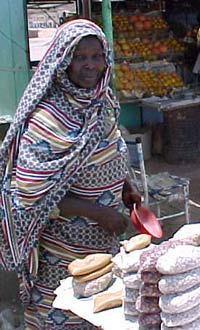


The Fur of Sudan
Centuries ago, the old Fur sultans (political rulers) used to derive power from direct and indirect control over the trade of ebony, ivory, spices, rich cloth, slaves and other goods from Darfur to Egypt over the so-called Forty Days Road (Darb al-Arba’een). Today, the Fur are politically associated with the North African country of Sudan, yet they still maintain their tribal solidarity, and are committed Muslims who pride themselves on the fact that they brought Islam to the west of Sudan.
Remarkably, the Fur maintained their independence until the year 1916, when the ruling sultan was defeated by the British and the province was politically integrated into Sudan. It is the Fur language that sets this group apart from surrounding tribes, yet as the decades pass on, many Fur have become increasingly Arabized, especially those who move to the cities and regularly speak Sudanese Arabic, the language of politics, trade and commerce. Despite this Arabization and Islamization, however, the Fur continue to maintain cultural and political consciousness, and their traditions are still very much alive.
What are their lives like?
The Fur, who number more than 700,000, live in western Sudan, primarily on the plains and foothills surrounding the volcanic mountain Jebel Marra. Some have migrated to cities and towns in order to find jobs, but most are farmers, cultivating both food for their families and cash crops that will enable them to buy items such as cloth, shoes, tea and sugar. The primary crop is millet (dukhn), which they make into a thick porridge-like paste called asida or nun. They eat the paste with a hot sauce which is normally made of vegetables, although meat may be added on special occasions or when visitors are entertained. Beer brewed from dukhn is also an important part of the diet, and is used as payment to those who help a man with his work in the fields—the work continues until the beer gives out.
Fur society is unique in that a husband and wife remain separate units even after marriage. Each owns and looks after his or her own fields and storage units, and each disposes of his or her respective produce separately. A wife may
 cook and brew beer for her husband, but she does so out of his food storage, not hers, while she cooks for herself and her children out of her own supplies. In return, a husband may help his wife with work such as the terracing of fields (which is often done in order to ward off erosion) or the hauling of manure, but each spouse remains a separate economic unit.
cook and brew beer for her husband, but she does so out of his food storage, not hers, while she cooks for herself and her children out of her own supplies. In return, a husband may help his wife with work such as the terracing of fields (which is often done in order to ward off erosion) or the hauling of manure, but each spouse remains a separate economic unit.
Villages vary in size from four or five households to 60 or more. People from the smaller villages travel to weekly markets in order to purchase supplies, but larger villages have their own market. Political power within the villages is usually determined by hereditary position. The village sheik, or religious leader, usually serves for life and is elected by villagers to represent them in relation to higher government-appointed officials.
What are their beliefs and needs?
It is thought that Islam was introduced and accepted into Fur society because of the old sultanates, who used to grant privileges to Muslim immigrants and build mosques and establish Islamic education for boys. Today, every boy at the age of 8-10 goes to Koran school to study Islam’s holy book unless they are already in the government’s formal school system. Although they still practice traditional rituals, Islam has penetrated to the extent that the name of Allah is used instead of the names of forefathers (wuonga) during rain rituals, and sacred trees and stones are associated with Islamic saints. Through the use of symbolic colors and rituals, the Fur attempt to build a sense of trust and solidarity amongst their tribe. They have not heard of the true unity and assurance that comes through Jesus Christ, and intense intercession and evangelism in needed in order to reach these people who are key to winning the rest of western Sudan.
How to pray for the Fur...
Pray that many Christian workers will go and share the Gospel with the Fur people.
Pray that as the Fur become increasingly religious in their practices, they will be dissatisfied with Islam and will seek and find the Truth of Jesus Christ.
Pray that God will raise up many intercessors to pray for this group that is so essential to reaching western Sudan.
Pray for the land of Sudan, which has faced war and economic turmoil for over a decade.
Pray for strength, encouragement and peace for the Christian laborers who are already working in Sudan.
Pray for the speedy development of Christian resources in the
Fur language.
Pray that God will open the hearts of Sudanese government officials so that missionaries can more easily enter the country.